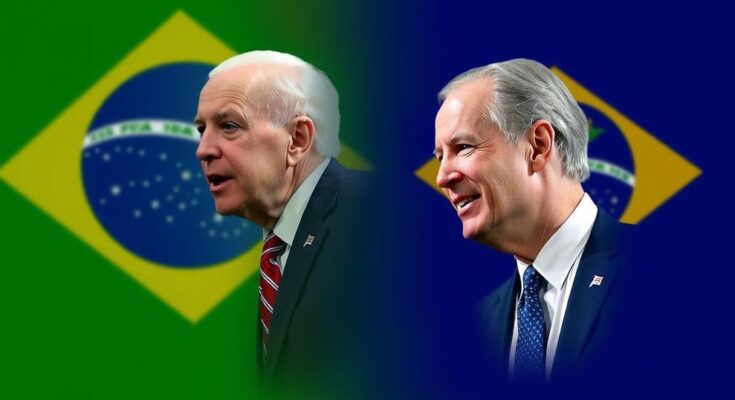President Biden is set to travel to South America for pivotal meetings, including the APEC summit in Peru and the G20 summit in Brazil. This trip, likely his last with world leaders before President-elect Trump takes office, will focus on reinforcing U.S. alliances amid significant policy shifts. Key discussions with leaders such as Chinese President Xi Jinping will center on trade, climate change, and maintaining strategic communications.
United States President Joe Biden is poised to embark on a significant diplomatic journey to South America, which is anticipated to be one of his final engagements with global leaders before the upcoming transition of power to President-elect Donald Trump. The President’s itinerary includes participation in the Asia-Pacific Economic Cooperation (APEC) summit in Lima, Peru, where he will conduct meetings with key leaders, including Peru’s President Dina Boluarte. This summit occurs in the context of heightened scrutiny surrounding international trade policies, particularly in light of Trump’s proposals to impose substantial tariffs that could impact the global economy. During his visit, National Security Adviser Jake Sullivan emphasized that Biden’s presence at APEC aims to reaffirm the United States’ commitment to its role in the Indo-Pacific region, a position he has strengthened during his administration. Following the APEC summit, Biden is set to meet with Chinese President Xi Jinping, marking their first engagement since last November; this meeting is expected to serve as a platform to facilitate a seamless transition of diplomatic communications, particularly regarding military relations. Biden’s agenda also includes a historic visit to the Amazon rainforest in Manaus, Brazil, making him the first sitting U.S. president to visit this vital ecosystem. The significance of this trip lies in his dedication to addressing climate change issues, in stark contrast to Trump’s anticipated departure from global climate initiatives. In Rio de Janeiro, Biden will participate in the G20 summit, aiming to reassure international allies of the United States’ commitment to shared security interests even as foreign policy dynamics shift under the incoming administration.
The geopolitical landscape is shifting as President Biden undertakes a crucial diplomatic mission to South America, coinciding with a period of uncertainty regarding America’s international priorities under a potential Trump administration. This trip underscores the Biden administration’s efforts to solidify alliances and global cooperation, especially concerning trade and climate change, two areas deeply influenced by contrasting policy approaches between the current administration and Trump’s anticipated foreign policies. The significance of Biden’s discussions with global leaders highlights the ongoing challenges and complexities involved in maintaining strategic relationships in an evolving international arena.
In conclusion, President Biden’s upcoming visit to South America represents a critical diplomatic effort to reinforce the United States’ commitments to its allies and address global issues such as trade and climate change. His engagement with leaders from Peru, Brazil, and China serves not only to outline a clear stance on these pressing matters but also to facilitate a smooth transition of foreign relations in light of the changing political context. As Biden prepares to hand over leadership to President-elect Trump, these summits could set the stage for future interactions between the U.S. and the global community.
Original Source: abcnews.go.com




